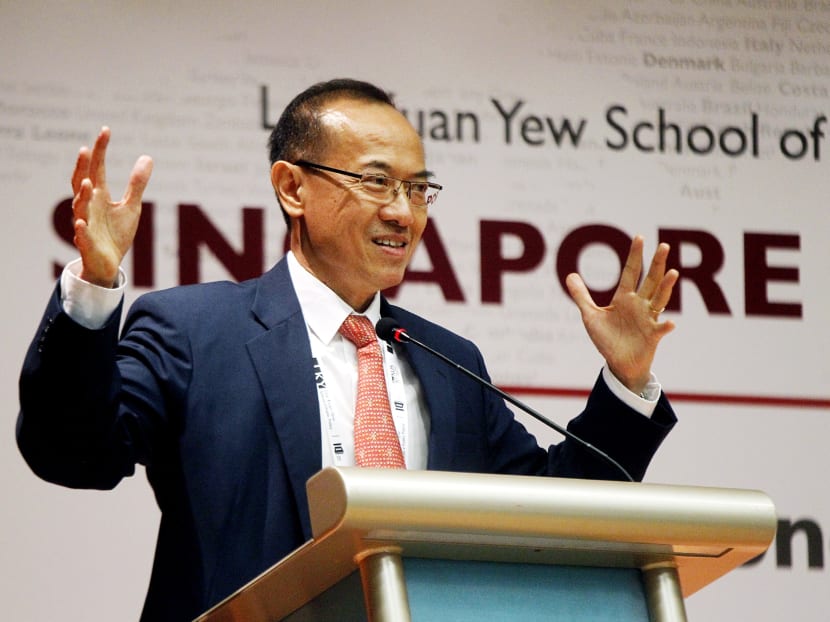Solution to extremism ‘must come from within Islamic world’
SINGAPORE — It will be a matter of time before militant group Islamic State of Iraq and Syria (ISIS) is put in its proper place, but such malignant cells may persist unless the Islamic world can find a way to immunise itself against extremist strains, said former Foreign Minister George Yeo yesterday.

Mr George Yeo giving a lecture at the Lee Kuan Yew School of Public Policy’s 10th Anniversary Conference on 17 November 2014. Photo: Ernest Chua
SINGAPORE — It will be a matter of time before militant group Islamic State of Iraq and Syria (ISIS) is put in its proper place, but such malignant cells may persist unless the Islamic world can find a way to immunise itself against extremist strains, said former Foreign Minister George Yeo yesterday.
“In terms of treating the problem in a deep way, the problem has got to be resolved within the ummah itself, within the world of Islam itself,” he said.
But the non-Muslim world has a vested interest in the good health of the Islamic community and should be supportive, said Mr Yeo at the Lee Kuan Yew School of Public Policy’s (LKYSPP) 10th Anniversary Conference, where he gave a speech on relationships and hierarchies changed by new media, before taking questions from the audience.
A visiting scholar with the LKYSPP, Mr Yeo was asked if the current approach of resolving the ISIS crisis was an appropriate one.
He expressed doubt that ISIS could succeed militarily. “For any power to prevail, it must solve two problems. First, it must be able to fight, (and) it must be able to produce. And I think, on both counts, there’s a limit to what (the Islamic State) can do.” However, the problem could recur elsewhere, he said.
Mr Yeo drew from Singapore’s experience in handling members of the Jemaah Islamiyah (JI) terrorist network after the 9/11 terrorist attacks on New York’s World Trade Centre.
After some JI members were arrested, the authorities here “didn’t quite know what to do because (the JI members) were living in their own mental universe”, he said.
Muslim scholars who were approached to talk to the detainees were initially suspicious, wondering why they were being associated with the extremists. But after many sessions, the scholars, or ulamas, remarked that the detainees had been invoking Islam in everything they had been doing. The ulamas then spoke to their religious communities.
“Word went around that something bad has happened and that they must be watchful and take counter measures”, said Mr Yeo. “So in a small limited way, we developed an immune system in Singapore, where the good cells identified the malignant cells, confined and attacked them.”
Military intervention by Western countries will not address the issue in a deep way, he added. In his speech, in which he used the Islamic State to illustrate the impact that social media is having all over the world, Mr Yeo said he felt the group’s beheadings of Westerners had been designed to exploit social media for political purposes— to encourage Western countries to join a coalition and create a “21st-century crusade” that would electrify the Sunni world. “Are they achieving their intended purpose? I’m not sure. They may be, because Western countries (are) recoiling in horror and responding to public pressure, one after another. Hands are raised to be part of the coalition,” he said.
In a wide-ranging speech, Mr Yeo said information technology is corroding hierarchies and changing relationships at various levels, causing a crisis among institutions around the world. Institutions need to adjust and it will be easier for cities such as Singapore and Hong Kong to do so, given their small size.
Referring to the ongoing Hong Kong protests, Mr Yeo said during the question-and-answer session that he was impressed by the civic consciousness of the youth demonstrators lobbying to directly elect the city’s Chief Executive. The territory has its problems and faces uncertainties, but Mr Yeo said it would survive because of its good, strong people.
“My point is this: Apart from the high politics, if at the atomic level, we have good people who are responsible, who care for one another, I think upon these bricks, we can build the most wonderful structures,” he said.
Singapore’s “special quality” is the multi-ethnic orientation of its people and its ability to connect to different cultural domains, turning this into its economic advantage, he said.
Mr Yeo, currently chairman of Kerry Logistics Network Limited headquartered in Hong Kong, was a politician for 23 years. He helmed the foreign affairs portfolio from 2004 to 2011, until he lost his Aljunied GRC seat in the General Election that year.
In a rare public engagement since he left politics, Mr Yeo showed he had not lost the common touch. Accidentally addressed as “minister” during the dialogue, he quipped: “George is absolutely fine, it happens to be my name.”






